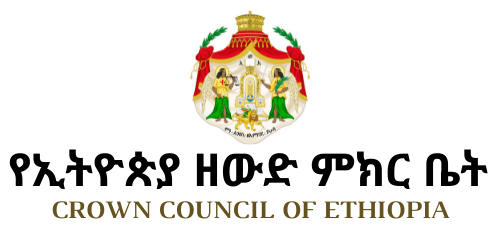Washington DC, May 18, 1999: — The death in Philadelphia, in the United States, on May 14 of Ethiopia’s most prominent prisoner of conscience, Dr Asrat Woldeyes, was called “tantamount to state liquidation” today by the Ethiopian Crown Council, in an official statement. Dr Asrat died from heart ailments exacerbated by his illegal imprisonment and ill-treatment at the hands of the Meles administration in Addis Ababa.
The statement was authorized by the President of the Crown Council, Prince Ermias Sahle-Selassie Haile-Selassie, on his return to Washington DC from Philadelphia, where he spent much of Dr Asrat’s final days.
Ethiopia’s most famous victim of the current Addis Ababa administration and onetime leader of the All-Amhara People’s Organization (AAPO), Professor Asrat Woldeyes, passed away on May 14, 1999, at the University of Pennsylvania Hospital in Philadelphia. USA.
The Crown Council immediately said that Dr Asrat’s untimely death was, in fact, “tantamount to state liquidation”, and was directly attributable to the Meles administration. “Dr Asrat’s death also highlights the plight of many others languishing illegally in Ethiopian prisons, their lives being shortened and darkened by an administration which seems to feel that it cannot accept criticism nor benefit from open debate.”
Prof. Asrat, a medical doctor and one of Ethiopia’s leading scientists and humanitarians, had been suffering from a variety of ailments, mostly centering around a heart disorder, when Meles administration officials — faced with daily protests around the world and mounting hostility from major governments — released him to seek medical treatment abroad just before Western Christmas 1998. He has been hospitalized ever since.
He had been personal physician to the late Emperor Haile Selassie I for a quarter century. He had been dismissed from his post at the Black Lion Hospital, in Addis Ababa, when the TPLF administration of Meles Zenawi seized power in 1991.
Prof. Asrat’s family, including his two sons, had gathered to be with him at the hospital at the end. As well, the President of the Crown Council, Prince Ermias Sahle-Selassie Haile-Selassie and Princess Gelila Fesseha, a niece of the Professor, were with him. Le’ult Gelila helped spearhead the campaign to have Dr Asrat released from his illegal imprisonment.
The Professor, who was in his seventies when he died, was preparing his legacy manifesto before his conditioned worsened in early May.
“Professor Asrat has already created his greatest legacy,” Crown Council President Prince Ermias said. “His legacy is that he has reaffirmed Ethiopia can only survive as a united, democratic country, and that this prize is worth sacrifice to achieve. Professor Asrat has always been a man of peace, dignity and intelligent reason. His imprisonment on trumped-up charges only serves to highlight the nobility of his non-violent protest and the bankruptcy of policies which are imposed by those who fear the will of the people. We cannot allow his sacrifice to be in vain. We cannot forget that his life has been shortened by what amounts to State murder, because he should have been able to complete his medical and teaching career in peace, and he should have been able to look forward to a long and happy retirement. All of this was denied to him, as such freedom is being denied to so many Ethiopians under illegal detainment by the Meles administration.”
The Meles administration released Dr Asrat when it became clear that his condition was deteriorating rapidly in prison. He had already become one of the focal points of protest against the administration, and officials feared that he would become a martyr if he died in prison.
“There is no doubt that Dr Asrat, who never saw himself as a martyr but rather as someone who needed to uphold principles of integrity and Ethiopianness, is now an even greater symbol of Ethiopia’s need for unity and for an end to the kind of repression which has characterized the totalitarianism of the Meles administration,” Dr Asrat’s nephew, Ato Youm Fesseha, said in Philadelphia. Ato Youm worked on the campaign to win his release.








